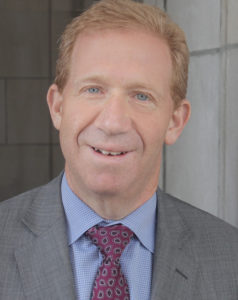Armonk’s Dr. Mitchell Roslin talks Weight Loss Surgery

Armonk’s Dr. Mitchell Roslin talks Weight Loss Surgery: “If you really think you can lose weight or lead a more active lifestyle – do it now! If that doesn’t work, surgery can be done safely,” Dr. Mitchell Roslin told us. Dr. Roslin, an Armonk resident, is the Director of Bariatric Surgery at Northern Westchester Hospital. A pioneer of Modified Duodenal Switch surgery, he is considered one of the best bariatric surgeons in New York. We sat down with Dr. Roslin to discuss obesity, yo-yo dieting and more…
What is obesity?
 Obesity is an excess fat issue, an energy storage disease. Obesity is often misunderstood. It has only gotten worse since people started talking about the accounting theory of obesity – calories in and calories out. All calories are not equal.
Obesity is an excess fat issue, an energy storage disease. Obesity is often misunderstood. It has only gotten worse since people started talking about the accounting theory of obesity – calories in and calories out. All calories are not equal.
Obesity occurs when we eat food that changes the balance of our hormonal and neurologic regulation. The key hormone is insulin, which most people think of as important in diabetes, but it is actually the body’s short-term energy hormone. High levels of insulin promote fat promotion and place a lock on fat breakdown. Foods that have a lot of sugar and starch promote insulin production and create a climate that promotes obesity.
The problem that most people with obesity face is that the body has a set point and the body wants to defend its weight. When people who have an energy storage disease try to lose weight, they lose a nominal amount and gain it back often going to a higher number – the yo-yo effect.
How does bariatric surgery impact Yo-Yo dieting?
The great thing about surgery is that it changes the set point and allows people to maintain a lower weight and actually changes many of the hormonal and neurologic regulators so it works for more than just mechanical reasons.
These changes have not been able to be duplicated by other remedies. Miraculously surgery changes the intestines, the stomach, pancreas, liver, muscle, and brain’s reaction to food. When we change the GI tract we change multiple ways that food is digested and the signals for hunger satiety. To duplicate it would take numerous medications that have not yet been invented.
How common is bariatric surgery?

Increasingly common but vastly under utilized. Once people are severely obese the probability of their reversal of medical problems is extremely low. Realistically, behavioral and medical treatments for obesity can offer people 10% of total body weight loss. And it is rarely maintained. For people who desire 30-40% of total body weight loss and a chance to maintain this for several years, surgery is the only alternative.
People who are obese and on hypertension, diabetes or cholesterol medications rarely are taken off medications or have their doses reduced. With surgery, resolution of diabetes is possible up to 90% of the time with certain surgical procedures.
Who is eligible for bariatric surgery?
The standard candidate for surgery is a person with class 3-obesity. Which translates to a body mass index of more than 40 and corresponds to a 5’ 4’ person weighing 230 pounds or a 5’ 10” person weighing 270 pounds. People with a BMI of 35, roughly 25-30 pounds lighter, but who suffer from hypertension, sleep apnea, coronary artery disease or diabetes would also be eligible for surgery. In fact international guidelines now suggest that surgery is the treatment of choice for Type 2 Diabetics who have a BMI greater than 35.
What are the typical weight loss results from bariatric surgery?

It varies on the operation. With the most common surgical procedure, Vertical Sleeve Gastrectomy, patients lose on average 30% of their total body weight. With an operation that we call Modified Duodenal Switch that goes up to about 40%.As one of the pioneers of this type of surgery, I believe it will be the fastest growing bariatric procedure in the future.
Are there other health benefits associated with weight loss surgery?
It’s absolutely essential to realize that everything interconnects. Obesity affects every organ in your body. Depending on the weight distribution it may affect different parts of your body in different ways. People with central obesity (abdomen) are more likely to have diabetes or heart issues. Those with peripheral obesity (hip/buttock) are more likely to have joint diseases.
As opposed to controlling your medical problems with medications, effective surgery can offer remission of medical problems. Adults don’t get better with Type 2 diabetes or hypertension. My patients usually get off most medications within 30 days of surgery.
What people don’t realize about obesity is it is going to replace cigarette smoking as the leading cause of cancer death in America. It is an inflammatory disease that can impact the body similar to things like Lupus. Surgery remains the only effective treatment.
What kind of lifestyle changes should patients be prepared for?
Surgery works because we fix the broken thermostat but what broke the thermostat is what you are eating. So a dietary education is very important after surgery. NWH offers a very active support group, as well as nutrition and dietary professionals that emphasize how to shop for food, how to prepare foods  and what to eat. You can’t be healthy unless you are fit and exercise is a very important corollary to every wellness program in the world. But independent of proper nutrition, exercise is not a weight loss strategy.
and what to eat. You can’t be healthy unless you are fit and exercise is a very important corollary to every wellness program in the world. But independent of proper nutrition, exercise is not a weight loss strategy.
Parting thoughts…
Our society has become obesogenic. We’re surrounded by tons of food choices, many of them bad. If you just go with the flow your going down the obesity pathway. The average person gains a pound a year. The average person who sees me gains 5 pounds a year. The cycle never changes.The target for the medical industry should be aimed at preventing people from needing bariatric surgery in the first place. An ounce of prevention is always worth a pound of cure, as they say.If you really think you can lose weight or lead a more active lifestyle – do it now!
If that doesn’t work, surgery can be done safely. It is as safe as gall bladder surgery and joint replacement surgery when done in top centers. Hospital stays are usually one day. And patients resume full activities in a very short period of time.
Mitchell Roslin, MD, FACS, FASMBS, has dedicated his professional career to the treatment of morbid obesity. He is considered one of the best bariatric surgeons in New York. Dr. Roslin has been performing weight loss surgery in New York since 1994 and laparoscopic obesity surgery since 2000. He was part of the LAP-BAND® System clinical trial and has expertise in duodenal switch, revisional bariatric surgery and SIPS surgery.
More Articles from Northern Westchester Hospital
More Articles on Health & Fitness

















